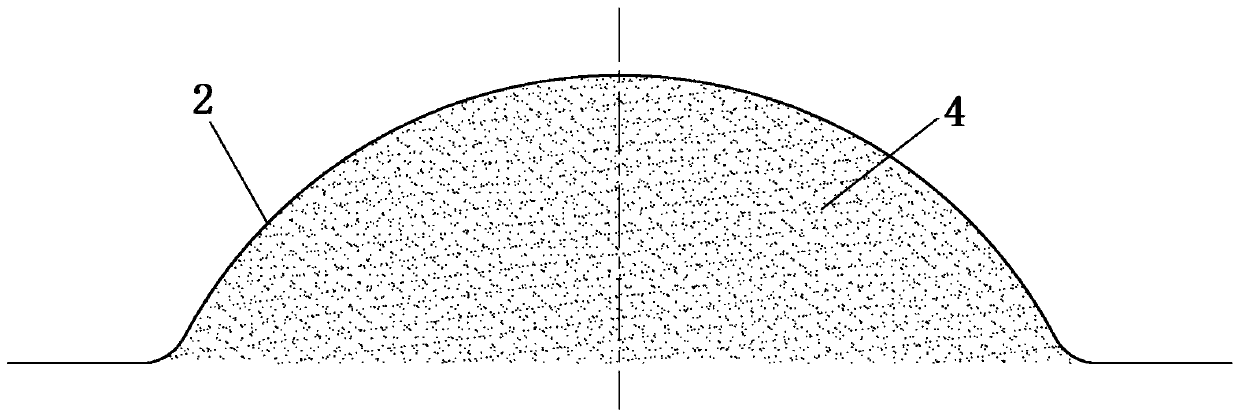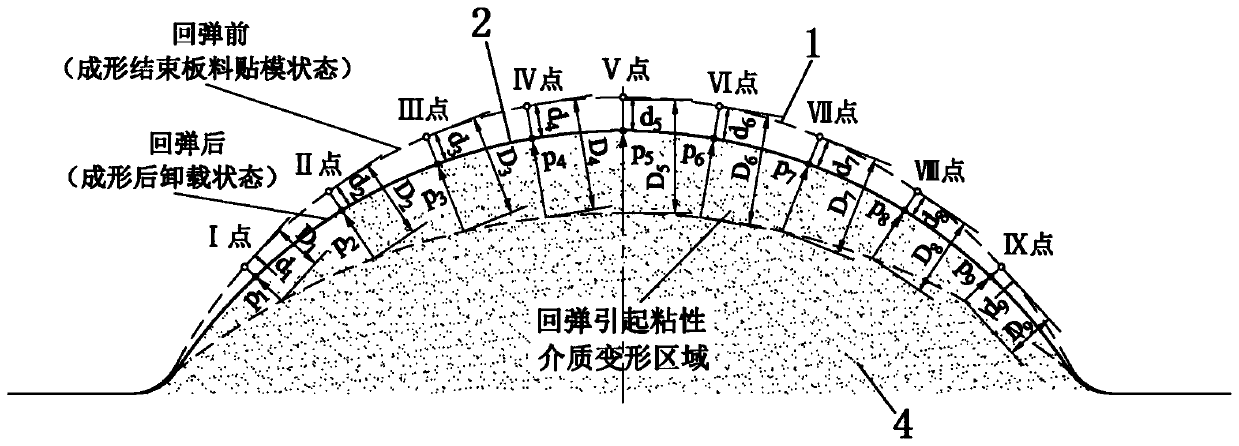Plate viscous medium pressure forming rebound self-adaptive control method
An adaptive control and viscous medium technology, applied in the field of plate forming, can solve the problems of long springback time, high cost, and limited improvement in dimensional accuracy, and achieve the effect of eliminating mold repair
- Summary
- Abstract
- Description
- Claims
- Application Information
AI Technical Summary
Problems solved by technology
Method used
Image
Examples
Embodiment 1
[0046] Embodiment one: select regular spherical concave mold 1 for use,
[0047] 1. The material of the blank 2 is stainless steel 304, 1.02×10 -3 hour,
[0048] The size of P is 130MPa; and in the selection of viscous medium 4, the strain rate sensitivity index m is 0.1, ΔP is 25-27MPa, V 1 =0.8mm / s, V 2 Under the condition of =0.1mm / s, the duration t only needs to be 5s, and the plate blank 2 can be formed without springback;
[0049] 2. The material of the blank 2 is aluminum alloy AL1060, 1.81×10 -3 hour,
[0050] The size of P is 70MPa; and in the selection of viscous medium 4, the strain rate sensitivity index m value is 0.5, ΔP is 13-18MPa, V 1 =0.3mm / s, V 2 Under the condition of =0.01mm / s, the duration t only needs to be 7s, and the plate blank 2 can be formed without springback;
[0051] 3. The material of slab blank 2 is superalloy GH4169, 2.75×10 -3 hour,
[0052] The size of P is 150MPa; and in the selection of viscous medium...
Embodiment 2
[0053] Embodiment two: select the die 1 of ladder shape for use, and the material of plate blank 2 is aluminum alloy AL1060, 1.81×10 -3 , the size of P is 80MPa; and when viscous medium 4 is selected, the strain rate sensitivity index m is 0.5, ΔP is 11MPa, V 1 =0.2mm / s, V 2 Under the condition of =0.06mm / s, the duration t only needs to be 8s, and the blank 2 can be formed without springback;
Embodiment 3
[0054] Embodiment three: select the concave mold 1 of variable-diameter component shape for use, and the material of plate blank 2 is superalloy GH4169, 2.75×10 -3 , the size of P is 170MPa; and in the selection of viscous medium 4, the strain rate sensitivity index m is 0.9, ΔP is 5MPa, V 1 =0.1mm / s, V 2 =0.005mm / s, the duration t only needs to be 8s, and the blank 2 can be formed without springback.
[0055] In summary, the present invention utilizes the strain rate sensitivity of the viscous medium 4, and its pressure can adapt to the shape change of the plate. During the pressure forming of the viscous medium 4, by controlling the unloading mode of the viscous medium 4 during the unloading process, the formed part is During the unloading process, the mold is repeatedly attached and the residual stress is gradually released to reduce the internal stress gradient of the formed part when it is finally attached to the mold. Not only can the springback be controlled,...
PUM
 Login to View More
Login to View More Abstract
Description
Claims
Application Information
 Login to View More
Login to View More - R&D
- Intellectual Property
- Life Sciences
- Materials
- Tech Scout
- Unparalleled Data Quality
- Higher Quality Content
- 60% Fewer Hallucinations
Browse by: Latest US Patents, China's latest patents, Technical Efficacy Thesaurus, Application Domain, Technology Topic, Popular Technical Reports.
© 2025 PatSnap. All rights reserved.Legal|Privacy policy|Modern Slavery Act Transparency Statement|Sitemap|About US| Contact US: help@patsnap.com



